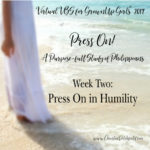Do you struggle to forgive yourself for the mistakes you’ve made? If you do, you’re not alone. But maybe you’ve heard that “forgiving yourself” isn’t a Biblical concept… that what we need is just to accept that God’s forgiven us. Easy to say, but not so easy to do. At least in my experience. That’s why I’ve asked my dear friend, Christian counselor and relationship coach Leslie Vernick, to shed light on what’s really going on in our hearts when we can’t get past our past — and how we can find a way forward:
Leslie writes:
Sometimes the hardest person to forgive is our own self. Perhaps you’ve had an abortion, had an affair or hurt someone deeply through your sinful or foolish behaviors. For some, lesser sins or even mistakes cause the same internal anguish. We’re tormented with “I should have known better,” or “What’s wrong with me” or “I can’t believe I did that.” Or “How could I have been so stupid, weak, blind…”
When we can’t move beyond our own failures, mistakes, and even sins, we can get stuck in spiral of debilitating regret, depression, and even self-hatred.
Yes, we know (or hear) God forgives us but we just can’t forgive ourselves. We may be told something like, “If the God of the Universe was willing to come to earth, become human, and sacrifice himself to forgive your sins, who are you not to forgive others, or your own self?”
Yet that theological truth can be difficult if not impossible to put into practice when you’re smack in the middle of ruminating over your stupid mistakes, missed opportunities, or sin. Although mentally acknowledged, God’s grace is not your internal reality. It’s theological truth but not transformational truth.
The way out of this internal bondage however, is not self-forgiveness, but rather self-acceptance. Although it’s hard for you to see the true problem, the reason you can’t forgive yourself is that you don’t want to have anything to need forgiveness for. You want to be like God – perfect and in control of all things.
You believe you should know how to do it right, to say it right, to know ahead of time what the right answer should be or what right solution will best solve a problem. If you could always live that way, then you’d feel much better about yourself. But when you fail (and as a mere mortal and sinful being you inevitably will), you feel profound disappointment and shame. You can’t believe how stupid, sinful, foolish, incompetent, scared, irresponsible, selfish, (whatever) you are. In beating yourself up, you are reinforcing your internal lie that you should have been better than that.
Before you can experientially accept God’s grace, you must emotionally (not merely intellectually) accept who you are. There is only one God and you are not Him. You are a creature: one who is called both saint and sinner, beautiful and broken. Humility is the only path that will give you the internal freedom you crave because once you are humble –Jesus called it “poor in spirit,” you are in a position to emotionally accept who you are— a fallible, imperfect, sinful creature who doesn’t know it all. Then you are no longer so shocked, shamed, or disappointed when you see your darker, sinful, weaker side.
It’s not your sins and failures that cause your greatest emotional pain. Rather it is your unrealistic expectations of yourself and your lack of acceptance when you mess up. In a backwards way, your pride has been wounded. You are disappointed that you aren’t better than you are. But the truth is, you’re not. In embracing that truth, you are also set free to embrace and experience the beauty of grace.
Now the grip of self-hatred for being imperfect no longer has the same power over you. Now that same emotional energy can be used to humbly ask for forgiveness from others where necessary. Instead of hating yourself for your sins and failures and weaknesses, now you can learn from them so you grow and don’t continually repeat your mistakes. Now you can fully experience what you so desperately crave, God’s love and forgiveness for your sinful, imperfect self.
One of my old fashioned mentors, François Fénelon wisely wrote, “Go forward always with confidence, without letting yourself be touched by the grief of a sensitive pride, which cannot bear to see itself imperfect.”
Go forward friend and emotionally accept your imperfections. It is in that place of humility coupled with Christ’s unconditional forgiveness will you find the freedom you long for.
Leslie Vernick is a licensed clinical social worker and relationship coach. For over 30 years, she has helped individuals, couples, and families heal, rebuild, or grow their relationships. A popular author and speaker, she has written six books, including The Emotionally Destructive Marriage — a guide for women trapped in abusive marriages. To learn more about Leslie, visit her website: www.LeslieVernick.com
Today’s Question: What Scripture brings strength and comfort to you as you seek God’s forgiveness in your own life? Remember that because of Him, in Him, and through Him, you are more than your mistakes! Don’t let your failures define you.









